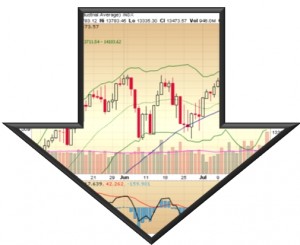 While derivative assets such as currency may have experienced a huge surge in popularity in the digital age (an estimated $220 billion is traded each hour on the forex market), this does not mean that more traditional assets are now longer relevant.
While derivative assets such as currency may have experienced a huge surge in popularity in the digital age (an estimated $220 billion is traded each hour on the forex market), this does not mean that more traditional assets are now longer relevant.
In fact, classic asset classes such as stocks have also benefited from technological advancement, with CFD (contracts for difference) trading enabling investors to access the equity market and profit even in a depreciating climate.
CFDs can also be applied across a host of alternative markets, and there’s no doubt that they offer huge value in the current climate. In this post, we’ll explore this trading vehicle in further detail while asking the core difference between CFDs and investing in stocks.
 CFD vs. Stock Trading – The Key Difference
CFD vs. Stock Trading – The Key Difference
In simple terms, trading stocks through traditional methods requires you to assume ownership of the underlying asset. This means that you’re ultimately tied to the performance of a specific stock or share price, making it extremely difficult to profit in a depreciating market.
CFD trading through brokers such as GKFX is different, however, in so much that they allow you to access the stock market without forcing you to own underlying stocks or equity. As a result, they enable you to speculate and hedge against specific stocks, creating an opportunity to profit even as values decline.
Through this type of arrangement, you’re investing in a contract between yourself and the CFD provider, rather than an underlying financial instrument or the stock itself. This is a seemingly small but significant difference, and one that is particularly important in a volatile marketplace or economic climate.
 Are There Any Other Advantages of CFD Trading?
Are There Any Other Advantages of CFD Trading?
Additionally, it also fair to surmise that CFD trading can afford you far greater exposure in the market and help you to create a more diverse portfolio. You could leverage CFDs to invest in indices rather than single stocks, for example, offering you access to growth markets on a large scale.
Similarly, CFDs are traded on margin, which in turn means that there’s no requirement to invest the full market value of a stock or asset class upfront. Instead, you can trade on marginal deposits without compromising on your market exposure, which is a huge boon in any setting.
Most importantly, this will allow you to open larger positions than your capital would otherwise allow, which will increase your potential returns in the case of successful trades.
You must log in to post a comment.